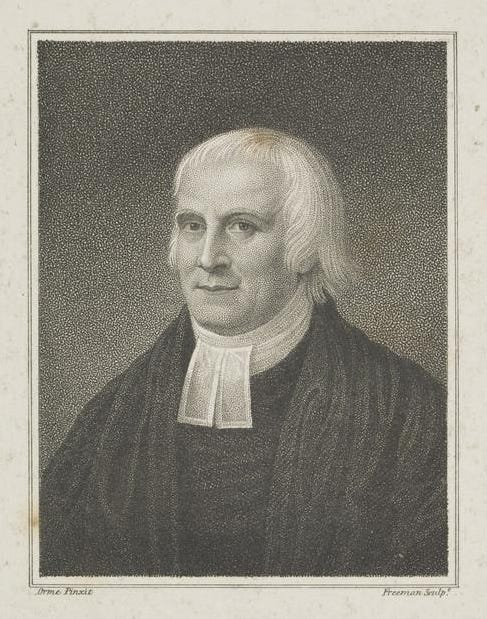Samuel Pearce's "holy love": evangelical catholicity in action
Above: David Bogue
In his best-selling memoir of Samuel Pearce (1766-1799), his friend Andrew Fuller (1754-1815) summed up his life thus: he was a man dominated by “holy love.”
Below, is a small extract from one of Pearce’s letters, written from London on Monday, September 28, 1795, to his wife Sarah (1771-1804) in Birmingham, that eloquently captures this love in action.
Pearce was in London with regard to some matters concerning the Baptist Missionary Society, which had been founded in 1792 and to which he alludes in this extract. David Bogue (1750-1825), whom he also mentions in this portion of the letter to his wife, was a remarkable pioneer of mission strategy. The meeting at which Pearce heard Bogue speak was one of those that led to the founding of the London Missionary Society.1
I preached yesterday morning in a Methodist chapel in the afternoon to a mixt communion church and in the evening for Dan Taylor, the champion of the General Baptists. I rejoice to find and feel that Christians of different names agree in the essentials of our blessed Religion ... a Religion whose Author and whose spirit is love. There have been six sermons preached in town at the institution of the Independent Mission Society. I attended on three. The rest though I longed to hear I could not through the affairs of the mission enjoy. It was a most glorious time. Between 2 and 300 ministers of various denominations were present. At the last meeting, Mr. Bogue, of Gosport, looked round the place and said: “We are come to the Funeral of Bigotry. I pray God it may be buried deep and never rise any more.” You, my love, will join me in a hearty Amen to so evangelical a wish.2
The day prior to writing this letter, Pearce tells his wife that he had preached in three churches, none of which belonged to his own denomination, which was that of the Particular (Calvinistic) Baptists: a Methodist congregation, which would have been Arminian; “a mixt communion” church, that is, one that was open-communion and open-membership—positions to which Pearce did not adhere, though his close friend, John Ryland, Jr. (1753-1825) did; and Daniel Taylor’s (1738-1816) congregation in Wandsworth, south-west London. Taylor was also Arminian and had been a significant theological critic of Pearce’s close friend Andrew Fuller, but neither of these things prevented either Pearce or Fuller preaching for him.
This is one key reason why I love the circle of men around Andrew Fuller: their genuine commitment to evangelical catholicity. When others in church history have spoken much about their love of the brethren, they lived it.
In our quarrelsome day when far too many Christian leaders—especially in my Evangelical and Baptistic and Reformed world—fight and squabble like fractious children, we need more men and women of the mettle of Samuel Pearce.
See the small study by Ross Patterson, “David Bogue – A Forgotten Father Of Cross-Cultural Mission” (https://fieldpartner.org/resources/articles/david-bogue-a-forgotten-father-of-cross-cultural-mission/; accessed December 10, 2024).
Cited Ernest A. Payne, “Some Samuel Pearce Documents,” The Baptist Quarterly 18, no.1 (January 1959): 30. My attention was drawn afresh to this text by Dr Baiyu Andrew Song.




